状语从句讲解
英语语法讲解状语从句
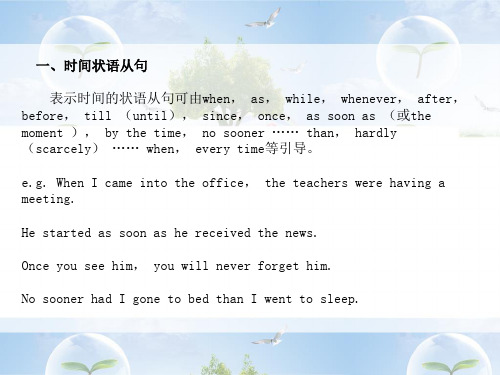
Whatever ( = No matter what ) you say, I'll never change my mind.
八、方式状语从句
方式状语从句常由as, as if (though), the way, rather than 等引导。
You can go swimming on condition that ( = if ) you don't go too far away from the river bank.
If he had come a few minutes earlier, he could have seen her.
e.g. He is disappointed because he didn't get the position.
As it is raining, I will not go out.
Now that you mention it, I do remember.
三、地点状语从句
引导地点状语从句的连词是where 和wherever等。 e.g. Sit wherever you like. Make a mark where you have a question.
一、时间状语从句
表示时间的状语从句可由when, as, while, whenever, after, before, till (until), since, once, as soon as (或the moment ), by the time, no sooner …… than, hardly (scarcely) …… when, every time等引导。
(完整版)状语从句的讲解最全的状语从句讲解

状语从句的讲解就是用一句话作状语分为:时间,地点,方式,原因,结果,条件,让步,目的,比较一、时间状语从句第一次见到你一见到你我就喜欢上了你直到见到你五岁时见到你When, as, while, before, after, since, till/until, as soon as no sooner…than…scarcely…when…hardly…when… the minute the second the instant the moment by the time 截止 immediately instantly directlyeach time every time next time the first time on doing sthwhenwhile 当…时as1。
when 1)当…时/ 延续性动词短暂性动词都可用2)这时/3)届时、到时I was watching TV when my cellphone suddenly rang这时When I was five years old I could speak five languagesThe wet weather will continue tommorow when a cold front is expected to arrive届时到时注意:时间状语从句中动作发生有前后时先发生的用过去完成时When my mother came back I had already gone to bed.2。
while 1)从句动词延续性2)同时发生3)对比的意味“然而”4)趁着He taught himself while he worked in a bank 延续性动词当他在银行上班时While we were working they were having a rest.对比While they were having a discussion , they got very confused。
初中状语从句讲解-PPT

2.用于否定句时,主句谓语动词是非延续性动 词,从句为肯定,意为“某动作直到某时间才开 始”。如He won’t go to bed till/until she returns.
3.till不可以置于句首,而until可以。如: Until you told me I had no idea of it.
从他离开后我们没见过面。
※ when: 持续性/非持续性动词都可以 当…时
Are you going to be a sailor when you leave school?
while /when辨析
❖ when/while+doing ❖ When/while reading,he fell asleep. ❖ when+终止性、延续性动词 ❖ while+延续性动词 ❖ When the teacher came in,I was sleeping. ❖ =While /When I was sleeping, the teacher came in. ❖ when (就在这时) ❖ I was sleeping, when someone knocked at the door.
❖ He spoke slowly in order that everyone should understand.
他讲得很慢以便人人能听懂。
1. They set out early _s_o_th_a_t_(_in_o_r_d_e_r _th_a_t_) they might arrive there in time.
While I really don’t like art, I find his work impressive. (while=__a_lt_h_o_u_g_h___)
状语从句知识点详解(初中英语专项复习)14

状语从句知识点详解(初中英语专项复习)状语从句的概念: 用一个句子作状语来修饰动词和形容词,以表明动作发生或状态存在的时间、地点、原因等,这个句子就叫做状语从句。
状语从句的分类:状语从句共分为九大类,包括:时间、地点、原因、条件、让步、目的、结果、方式、比较状语从句。
下面分别讲解:一、时间状语从句概念:用来表示时间的状语从句,由when, while, as, till, until,before, after, since等引导。
由于时间状语从句的引导词所表示的意思并非一致,不同引导词表达不同的时间,它们在句子中对应的时态、语态等也有所不同。
例如:when /while引导的时间状语从句when引导的从句的谓语动词通常是瞬间动词,也可以是延续性动词。
从句动作可与主语动作通常先后发生也可同时发生。
I was writing when my sister came back.( come是瞬间动词,只能用when引导,不能用while)He often wrote me when/while he studied in Shanghai International Studies University.( study 是延续性动词,while可代替when)While my mother was cooking , I was playing chess with dad. (cook是延续性的动词,cook和play同时发生)I like playing chess while my sister likes reading stories.我喜欢下棋,而我姐姐喜欢看小说。
(while表示对比)when和while的区别还有:while引导的时间状语从句多用于进行时态,而when引导的时间状语从句多用于一般时态。
While we were playing games, our headmaster called me .我们正在做游戏的时候,校长叫我了。
状语从句的详细讲解
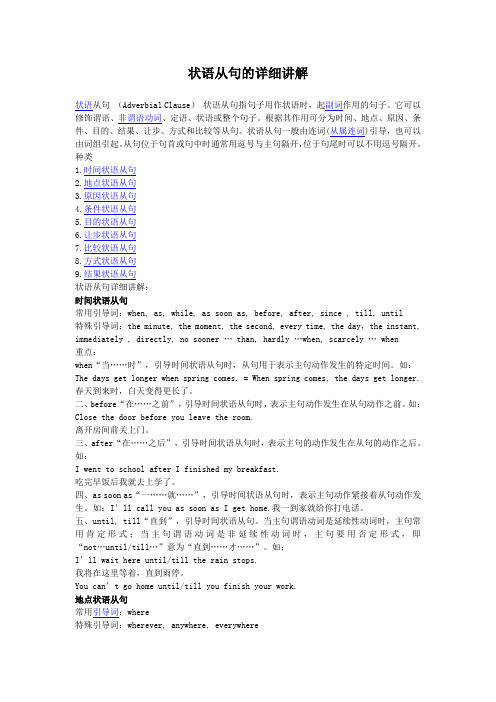
状语从句的详细讲解状语从句(Adverbial Clause)状语从句指句子用作状语时,起副词作用的句子。
它可以修饰谓语、非谓语动词、定语、状语或整个句子。
根据其作用可分为时间、地点、原因、条件、目的、结果、让步、方式和比较等从句。
状语从句一般由连词(从属连词)引导,也可以由词组引起。
从句位于句首或句中时通常用逗号与主句隔开,位于句尾时可以不用逗号隔开。
种类1.时间状语从句2.地点状语从句3.原因状语从句4.条件状语从句5.目的状语从句6.让步状语从句7.比较状语从句8.方式状语从句9.结果状语从句状语从句详细讲解:时间状语从句常用引导词:when, as, while, as soon as, before, after, since , till, until特殊引导词:the minute, the moment, the second, every time, the day,the instant, immediately , directly, no sooner … than, hardly …when, scarcely … when重点:when“当……时”,引导时间状语从句时,从句用于表示主句动作发生的特定时间。
如:The days get longer when spring comes. = When spring comes, the days get longer. 春天到来时,白天变得更长了。
二、before“在……之前”,引导时间状语从句时,表示主句动作发生在从句动作之前。
如:Close the door before you leave the room.离开房间前关上门。
三、after“在……之后”,引导时间状语从句时,表示主句的动作发生在从句的动作之后。
如:I went to school after I finished my breakfast.吃完早饭后我就去上学了。
英语状语从句讲解
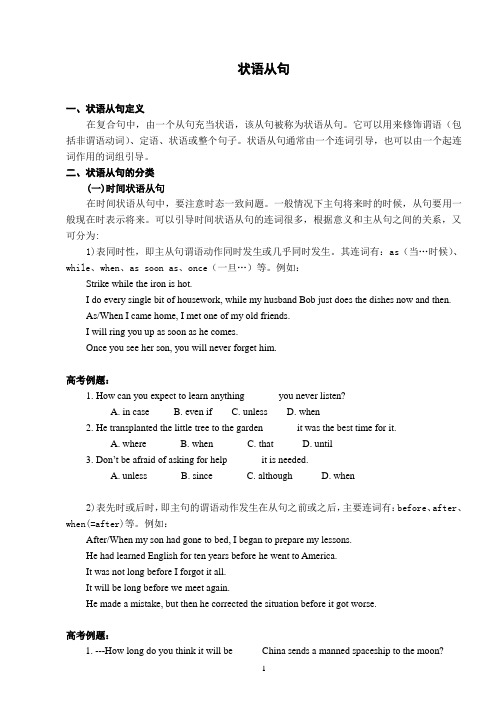
状语从句一、状语从句定义在复合句中,由一个从句充当状语,该从句被称为状语从句。
它可以用来修饰谓语(包括非谓语动词)、定语、状语或整个句子。
状语从句通常由一个连词引导,也可以由一个起连词作用的词组引导。
二、状语从句的分类(一)时间状语从句在时间状语从句中,要注意时态一致问题。
一般情况下主句将来时的时候,从句要用一般现在时表示将来。
可以引导时间状语从句的连词很多,根据意义和主从句之间的关系,又可分为:1)表同时性,即主从句谓语动作同时发生或几乎同时发生。
其连词有:as(当…时候)、while、when、as soon as、once(一旦…)等。
例如:Strike while the iron is hot.I do every single bit of housework, while my husband Bob just does the dishes now and then.As/When I came home, I met one of my old friends.I will ring you up as soon as he comes.Once you see her son, you will never forget him.高考例题:1. How can you expect to learn anything ______ you never listen?A. in caseB. even ifC. unlessD. when2. He transplanted the little tree to the garden ______ it was the best time for it.A. whereB. whenC. thatD. until3. Don’t be afraid of asking for help ______ it is needed.A. unlessB. sinceC. althoughD. when2)表先时或后时,即主句的谓语动作发生在从句之前或之后,主要连词有:before、after、when(=after)等。
状语从句讲解
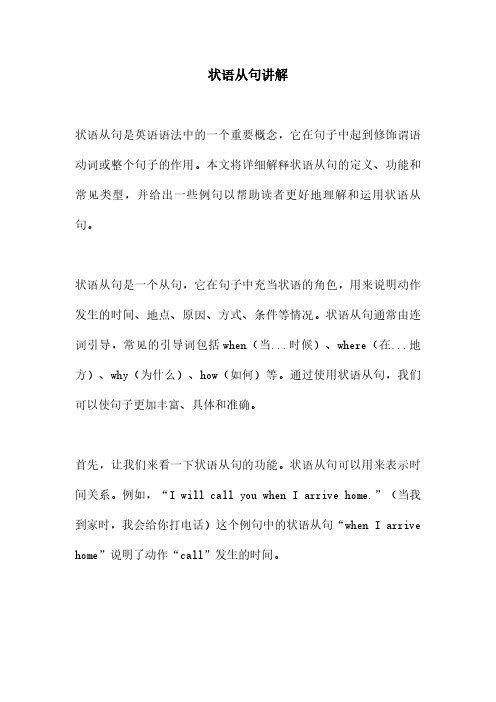
状语从句讲解状语从句是英语语法中的一个重要概念,它在句子中起到修饰谓语动词或整个句子的作用。
本文将详细解释状语从句的定义、功能和常见类型,并给出一些例句以帮助读者更好地理解和运用状语从句。
状语从句是一个从句,它在句子中充当状语的角色,用来说明动作发生的时间、地点、原因、方式、条件等情况。
状语从句通常由连词引导,常见的引导词包括when(当...时候)、where(在...地方)、why(为什么)、how(如何)等。
通过使用状语从句,我们可以使句子更加丰富、具体和准确。
首先,让我们来看一下状语从句的功能。
状语从句可以用来表示时间关系。
例如,“I will call you when I arrive home.”(当我到家时,我会给你打电话)这个例句中的状语从句“when I arrive home”说明了动作“call”发生的时间。
其次,状语从句可以表示地点关系。
例如,“She looked around to see where the noise was coming from.”(她四处看看,想知道声音是从哪里传来的)这个例句中的状语从句“where the noise was coming from”说明了动作“look around”的地点。
此外,状语从句还可以表示原因、条件和方式等关系。
例如,“He couldn't go to the party because he was sick.”(他因为生病所以不能去参加聚会)这个例句中的状语从句“because he was sick”表示了动作“couldn't go”的原因。
在使用状语从句时,需要注意一些语法规则。
首先,状语从句通常放在主句之前或之后,具体位置取决于需要强调的内容。
其次,状语从句的谓语动词通常使用一般现在时,而不受主句的时态影响。
例如,“I will call you when I arrive home.”(当我到家时,我会给你打电话)中的“arrive”使用的是一般现在时。
状语从句讲解经典
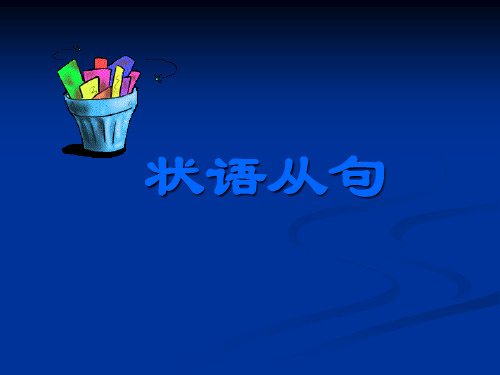
意思为既然或考虑到 (原因状语从句) It was foolish of you to take a taxi when you could easily walk there. How can they learn anything when they spend all their spare time watching television? Why do you want a new job when you have got such a good one? There is no point (in) owning a car when we have so good a public transport system. Why use metal when you can use plastic? How can he get the promotion when his boss dislikes him?
I will tell her about it when I see her. I was about to fall asleep when my sister came in. I will go home when he comes back.
I recognized the thief when/ as I passed him. When he finished his lecture, people stood up and applauded. I was walking on the street when I came across an old friend. We were about to set off when it began to rain. He had just finished the work when the doorbell rang. We were on the point of driving away when the policeman signed us to stop.
- 1、下载文档前请自行甄别文档内容的完整性,平台不提供额外的编辑、内容补充、找答案等附加服务。
- 2、"仅部分预览"的文档,不可在线预览部分如存在完整性等问题,可反馈申请退款(可完整预览的文档不适用该条件!)。
- 3、如文档侵犯您的权益,请联系客服反馈,我们会尽快为您处理(人工客服工作时间:9:00-18:30)。
状语从句3.1 方式状语从句方式状语从句通常由as, (just) as…so…, as if, as though引导。
1)as, (just) as…so…引导的方式状语从句通常位于主句后,但在(just) as…so…结构中位于句首,这时as从句带有比喻的含义,意思是"正如…","就像",多用于正式文体,例如:Always do to the others as you would be done by.你希望人家怎样待你,你就要怎样待人。
As water is to fish, so air is to man.我们离不开空气,犹如鱼儿离不开水。
Just as we sweep our rooms, so we should sweep backward ideas from our minds.正如打扫房屋一样,我们也要扫除我们头脑中落后的东西。
2)as if, as though两者的意义和用法相同,引出的状语从句谓语多用虚拟语气,表示与事实相反,有时也用陈述语气,表示所说情况是事实或实现的可能性较大。
汉译常作"仿佛……似的","好像……似的",例如:They completely ignore these facts as if (as though) they never existed.他们完全忽略了这些事实,就仿佛它不存在似的。
(与事实相反,谓语用虚拟语气。
)He looks as if (as though) he had been hit by lighting.他那样子就像被雷击了似的。
(与事实相反,谓语用虚拟语气。
)It looks as if the weather may pick up very soon.看来天气很快就会好起来。
(实现的可能性较大,谓语用陈述语气。
)说明:as if / as though也可以引导一个分词短语、不定式短语或无动词短语,例如:He stared at me as if seeing me for first time.他目不转睛地看着我,就像第一次看见我似的。
He cleared his throat as if to say something.他清了清嗓子,像要说什么似的。
The waves dashed on the rocks as if in anger.波涛冲击着岩石,好像很愤怒。
3.2 原因状语从句(1) because 只能它能用来回答why引导的问句。
可以与just, only 连用。
My friends dislike me because I am handsome and successful.Just because I don’t complain (抱怨), people think I am satisfied.(2) Since 表示人们已知的事实,不须强调的原因,通常译成“既然”。
Since ev eryone is here, let’s get started.Since you are sleepy, you might just as well go to bed.(3) As 和since 的用法相似,所引出的理由在人们看来已经很明显,或已为人们所知。
She didn’t hear us come in as she was asleep.As Monday is a national holiday, all government offices will be closed.(4) For 表示推断的理由,对前面的分句内容加以解释或说明,通常放在主句后面。
The days are short, for it is now December.It rained last night, for the ground is wet this morning.3.3 目的状语从句表示目的状语的从句可以由that, so that, in order that, lest, for fear that, in case等词引导,例如:You must speak louder so that /in order that you can be heard by all.“以免,以防,生怕, 万一”for fear that, lest, in caseBetter take more clothes in case the weather is cold.He wrote the name down for fear that/lest he should forget it.Take an umbrella with you lest it should rain.She cleans the window with great care lest she might break the glass.Take an umbrella, in case it rains.He had his camera ready, just in case he saw something that would make a good picture.3、4 结果状语从句结果状语从句常由so… that 或such…that引导,掌握这两个句型,首先要了解so 和such 与其后的词的搭配规律。
比较:so和such其规律由so与such的不同词性决定。
such 是形容词,修饰名词或名词词组,so 是副词,只能修饰形容词或副词。
so 还可与表示数量的形容词many, few, much, little连用,形成固定搭配。
so foolish such a foolso nice a flower such a nice flowerso many / few flowers such nice flowersso much / little money. such rapid progressso many people such a lot of people(so many 已成固定搭配,a lot of 虽相当于many,但 a lot of 为名词性的,只能用su ch搭配。
)so…that与such…that之间的转换既为so与such之间的转换。
The boy is so young that he can't go to school.He is such a young boy that he can't go to school.3.5 条件状语从句连接词主要有if, unless, as/so long as, on condition that, suppose that, supposing (that), p roviding/provided that 等。
.if 引导的条件句有真实条件句和非真实条件句两种。
非真实条件句已在虚拟语气中阐述。
unless = if not.Let's go out for a walk unless you are too tired.If you are not too tied, let's go out for a walk.I may lend you the book on condition that you return it to me in time.Suppose nothing happens to you.He will surely finish the job on time _____ he’s left to do it in his own way.A. in thatB. in caseC. as far asD. so long as (D)You will be late ___ you leave immediately.A. unlessB. untilC. ifD. orA。
句意:除非你立即走,否则你就回迟到的。
可转化为If you dong leave immediately, you will be late.B、D句意不对,or表转折,句子如为You leave immediately or you w ill be late.3.6 让步状语从句1) though, although注意:当有though, although时,后面的从句不能有but,但是though 和yet可连用Although it's raining, they are still working in the field.虽然在下雨,但他们仍在地里干活。
He is very old, but he still works very hard.虽然他很老,但仍然努力地工作。
Though the sore be healed, yet a scar may remain.伤口虽愈合,但伤疤留下了。
(谚语)___she is young, she knows quite a lot.A. WhenB. HoweverC. AlthoughD. Unless答案:C。
意为虽然她很年轻,却知道许多。
2)as, though 引导的倒装句as / though引导的让步从句必须表语或状语提前(形容词、副词、分词、实义动词提前)。
Child as /though he was, he knew what was the right thing to do.= Though he was a small child, he knew what was the right thing to do.Young as he is, he is knowledgeable.Poor as he is, he is honest and kind.Much as I respect him, I can’t agree with him.Try as he will, he can’t persuade his brother.Lose money as I did, I got a lot of experience.注意: a.句首名词不能带任何冠词。
b.句首是实义动词,其他助动词放在主语后。
如果实义动词有宾语和状语,随实义动词一起放在主语之前。
Try hard as he will, he never seems able to do the work satisfactorily.= Though he tries hard, he never seems…虽然他尽了努力,但他的工作总做的不尽人意。
